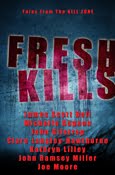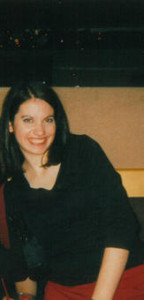Category Archives: The Kill Zone
Success at Last
First Page Critique: Erased
A first page critique by Nancy J. Cohen
The Chicken Guy
Excerpt from THE TUNNELS:
“So what do you think?”
Kelly looked up from her notes to find Morrow watching her, rocking back and forth on his heels with a half-smile.
“Not our guy.” She rubbed her eyes with a thumb and forefinger and suppressed a yawn.
“Told you. Long day, huh? Where’d they pull you in from?”
“Jersey.”
“Oh, right, the chicken guy. Nice work on that one.”
“Thanks…”
In my debut thriller THE TUNNELS, I made this oblique reference to FBI Special Agent Kelly Jones’s previous case. Over the years I’ve received several emails from readers curious to hear more about “The Chicken Guy” (although as we here at The Kill Zone know, by all rights that title belongs to Mr. John Ramsey Miller, who is currently breeding a chicken army for world conquest).
So when it came time to submit a story for our anthology, I thought this would be great material to mine.
I’ve probably only composed a few dozen short stories total over the course of my writing career. With this one, I decided to focus on a single setting, the scene that would mark the climax if it were a full novel. I wanted to write something that was almost pure action, where you really got to see Kelly do what she does best.
I enjoyed exploring my heroine through a prequel. Part of the story laid the groundwork for crises she’d face down the line, tests of her moral code that over the course of my series have become increasingly challenge for her to pass. Hints of that popped up as I was writing The Chi cken Guy. Knowing where she ends up made it much easier to figure out where she started.
cken Guy. Knowing where she ends up made it much easier to figure out where she started.
As I was editing, I caught myself wondering if I would have written the story the same way if I’d tackled it immediately before writing THE TUNNELS. And as I’m putting the finishing touches on my fourth novel featuring the same characters, I was struck by how much Kelly in particular had been forced to change. What I love about writing a series (and about watching a well-made TV series, as opposed to a film) is that it enables a much greater story arc. A character grapples with different challenges in each book, challenges that shape how they’ll act when faced with new situations down the line. I’ve put Kelly through the wringer over the course of these four books. She’s emerged far more damaged than when she started, but in a way stronger than she was at the outset. It was interesting for me to look back on her through this lens, to see how far she’s come in so many ways.
We’re discussing assembling another anthology later in the year. For that one, I’m toying with the idea of delving further into the life of a more minor character from the series, one I haven’t had the opportunity to really explore. What I’ve discovered through this process is that short stories can be a great tool for character development, a chance to see how a tangential story line can have an impact. As Joe said, this is a great format to do that kind of exploration.
The anthology is available on Amazon and at Smashwords for the bargain price of $2.99.
Finding inspiration far from home
Confessions of an Editor
That just isn’t the case. The majority of my actual editing and reading (and I know this was true for almost all of my colleagues as well) happened at home in my “free” time. Otherwise we all had to be very personable and present in the office as we worked on many different projects at once.
Serendipity
Today is July 26, a day of celebration for me. For one thing, it marks my debut on The Kill Zone, and I couldn’t be more pleased to be included with six writers I admire. I’ve learned a lot from this august company, and am proud to be added to the mix.
This date also happens to be one that changed my life forever—for it was on July 26, 1980, that I met my wife.
I was at a birthday party for a friend. It had spilled out into the courtyard of his apartment building, where I sat at a table with a couple guys, yakking. I happened to look up and saw a blond vision of loveliness heading up the stairs to the apartment. I turned to my comrades and said, “I’ll see you later.”
I got to the apartment just as she was hugging my friend. Her back was to me. I silently motioned for my friend to introduce me. And that, as they say, was that. I fell like five tons of brick and mortar. It took me all of two-and-a-half weeks to ask her to marry me. (Perhaps this explains why I favor first page action in my books). Eight months later we were wed and my life has been richly blessed ever since (in no small part due to Cindy’s sharp editorial eye; she’s always my first reader).
When I think of these events, the word serendipity comes to mind. It’s a word derived from a Persian fairy tale, The Three Princes of Serendip (an ancient name for Sri Lanka). The story tells of an eminent trio making happy discoveries in their travels, through accident and observation. The English writer Horace Walpole coined the term serendipity to describe this combination of chance and mental discernment.
Which is a long way of saying that some of the best things that happen to us in life are “happy accidents” because we’ve shown up, and are aware.
Much of the best writing we do is serendipitous, too. As Lawrence Block, the dean of American crime fiction, put it, “You look for something, find something else, and realize that what you’ve found is more suited to your needs than what you thought you were looking for.”
Doesn’t that describe some of the best moments in your writing? I once had a wife character who was supposed to move away for a time, to get out of danger. That’s what I’d outlined. But in the heat of a dialogue scene with her husband, she flat out refused to go. Turns out she was right and I was wrong, and the story was better for it.
Can we ramp up serendipity as we write? I think so. Here are a few suggestions.
Don’t just be about imposing your plans on the story to the detriment of happy surprises. Be ready to shift and move.
The way of serendipity is open to every writer, be you an outliner or a seat-of-the-pants type, or anything in between. It’s just a matter of showing up and being aware. And the more you write, the more you’ll recognize serendipitous moments when they arise.
Has serendipity played a role in your own writing? Tell us about it.
And thanks again to The Kill Zone for the invitation. A happy surprise indeed.
Does being a writer make you a lousy reader?
I brought home many, many books from Thrillerfest. So many books that Delta charged me an extra fifty bucks for the sardine flight back to LA.
As soon as I settled into my seat, I opened the first thriller from my TBR bag. I was looking forward to it. The book had an eye-catching cover that was plastered with snippets of positive reviews, accompanied by blurbs from BNAs (Big Name Authors). Best of all, the story opened with a plane crash. I’m a nervous-Nelly flier, so I was ready to be terrified.
But ten pages into the book, I was yawning. Worse, I was getting irritated with the author.
As the pages dragged on, I started pulling apart each paragraph in my head, muttering things like, “This dialogue is way too symmetrical. You should have changed up the rhythm here, lost that attribution tag there. How the heck did you get those BNA blurbs?”
After a few more pages, my mental rewrite got too exhausting. Thriller #1 was a bust. I tossed it back into the bag.
Thriller #2 was a winner, but I still couldn’t get into it fully. Every time I hit a taut scene or a seamless transition, I detached and thought, “Okay, so how did this writer pull that off? What can I learn here?”
Unfortunately, being a writer has spoiled the reading experience for me. I can’t lose myself in books the way I used to. I’m like a nosy, jealous chef, sampling dishes and trying to figure out what spices were used.
My reading rut started about the time that I started writing my current series. I had no time to read due to a combination of deadline pressures and my day job. Now that I’m shifting gears to write in a new genre (and am sans day job, say hallelujah), I’m reading again. It’s like I’m mapping brand new waters, separating the sharks from the flounders. (I know: Block that metaphor!).
It’s good to be reading again. But darnit, the thrill is gone.
How about you? Does being a writer kill some of the joy of the reading experience?
Notes from Thrillerfest
Getting unstuck: Dealing with writer’s block
I thought about titling this post Coming unstuck, which lets you know how I feel about today’s topic: Writer’s block.
I never used to understand what people meant by “writer’s block.” I ‘d always felt immune to that scribe’s disease. When I wrote the first two books in my current series, I had a machine-like discipline. I’d get up at four a.m. every morning and write for at least two hours. No. Matter. What. My progress was always slow but steady. I wrote almost the same number of pages every day. My writing group members were in awe of me.
But then along came Book Three, and I went into a bit of a slump. Actually it felt more like an avalanche. Even though I loved the story I was working on, sometimes I’d find that days would pass without any progress at all. I eventually had to ask for–gasp!–an extension from my editor, who graciously granted it to me. But even then I kept running behind. Ultimately I made the new deadline, but barely. Now I have a recurring nightmare about missing the deadline, which has replaced my old nightmare about discovering that I’ve missed an entire semester of a class, just before the final exam.
So what exactly is writer’s block? I think the term is a bit misleading. It implies that the writer doesn’t know what to write about — such as a lack of inspiration, perhaps. In my case I knew the story I wanted to write, but I seemed to have lost the daily writing rhythm along the way. Maybe what I had was actually energy block. Or focus block.
So here were a few of my cures for The Block. All of them proved to be helpful at times:
- Write 15 minutes a day
You can write for at least 15 minutes today, even if you’re the busiest person on the planet. Doing that small amount per day helps you get the habit and rhythm back. Over time, your progress will add up. - Write at the same time each day.
I think this is the single most helpful habit that will enable you to break through writer’s block. If you sit your butt down in a chair at the same time every day, your body starts to learn that this is the time for writing. Your writing flow will start to kick in at that time. - Free writing
This technique is where you grab a couple of random words and “free write” them into your WIP for a set amount of time. Actually, this one has never worked that well for me. Whenever I try free writing, I get stuck at the same damned spot that I’m stuck in my regular writing. And then I get even more depressed about my writer’s block. But I know that free writing works wonders for some people. For great tips about free writing and other ways to break through The Block, I recommend Barbara DeMarco-Barrett’s book, Pen On Fire: A Busy Woman’s Guide To Igniting The Writer Within. (Guys can pick up a few tips too!) - Put your writing first
I have many acquaintances who have endless reasons for not writing. Anniversaries, birthdays, conflicting deadlines, vacations, relatives visiting…you get the idea. Unsurprisingly, these people are frequently blocked writers. Your writing needs to be a first priority in your life, or you’ll be doin’ time inside The Block.
What about you? Have you ever wrangled with writer’s block, or energy block? Any solutions you can share?
~~~~~~~~~~~~~~~~~~~~
Coming Sunday, June 21, Paul Kemprecos tells us what it’s like to collaborate with Clive Cussler. And future Sunday guest bloggers include Robert Liparulo, Linda Fairstein, Julie Kramer, Grant Blackwood, and more.







